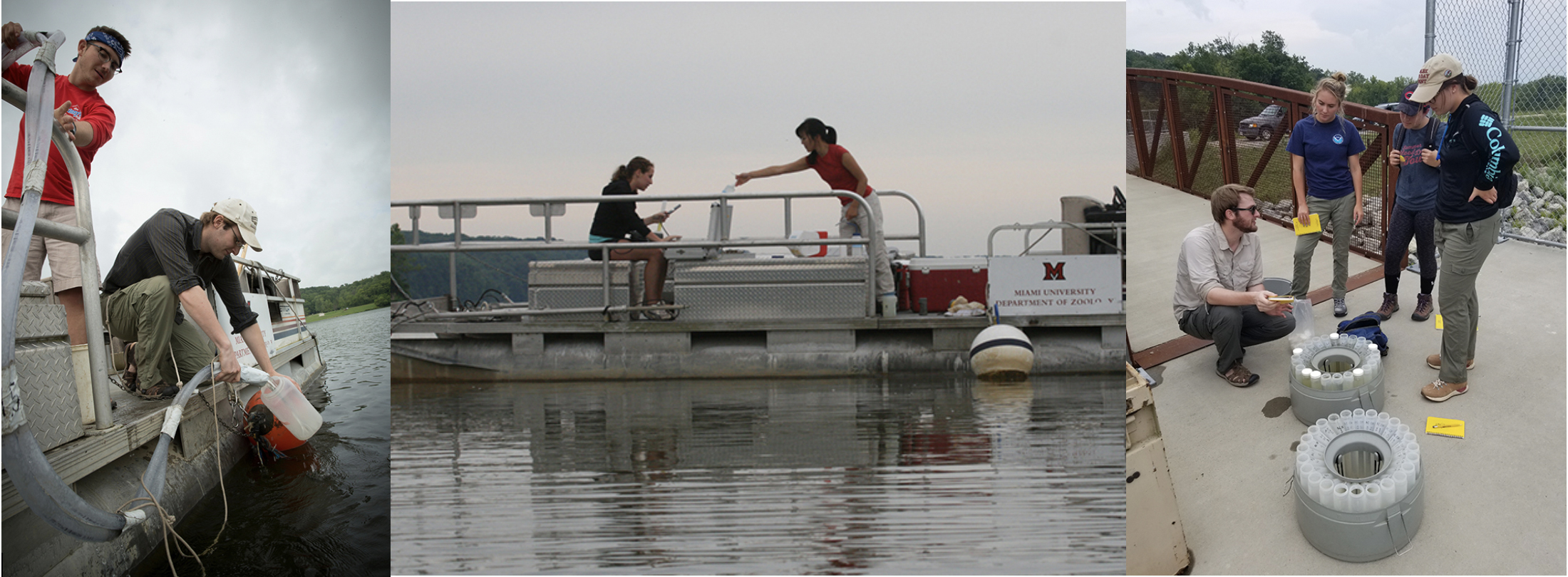

25 years of ecosystem research on Acton Lake supported by NSF
The only NSF Long Term Research in Environmental Biology project funded in Ohio this year
By Susan Meikle, university news and communications
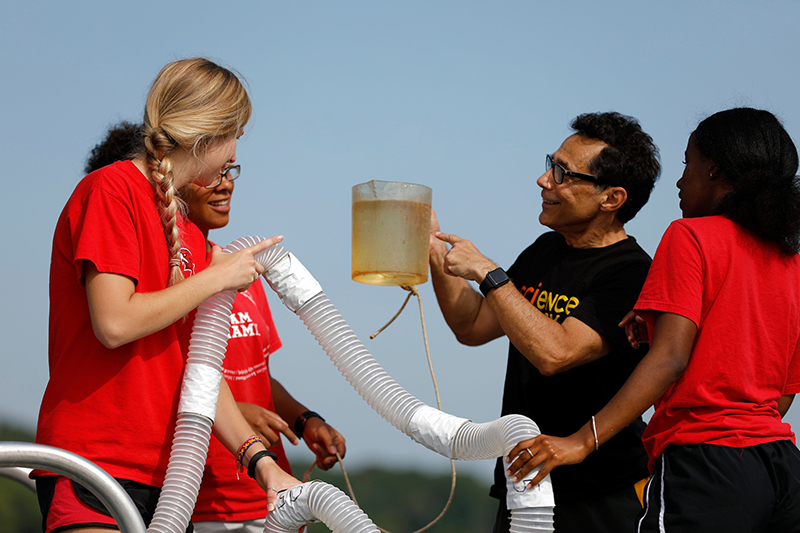
Mike Vanni (center) and Miami students (left to right) Isabelle Anderson ('19), Ashley Mickens and Ferdos Abdulkader collect samples from Acton Lake, summer 2018 (photo by Jeff Sabo).
A team of Miami University scientists, led by Mike Vanni, professor of biology, received its fourth National Science Foundation Long Term Research in Environmental Biology (NSF LTREB) grant in support of long-term research at Acton Lake, a reservoir in Oxford, Ohio.
The LTREB grant provides $634,999 over the next five years for Vanni and his research team. It is the only LTREB project currently funded in Ohio.
The research looks at how long-term changes in agriculture affect streams and lakes, using the Acton Lake watershed as a model system.
The research team
Vanni has studied Acton Lake and its watershed for more than 25 years. His research on Acton Lake has been supported continuously since 1994 by the NSF, with the past 15 years through the NSF LTREB award program (researchers can only apply for an LTREB grant after they have six years of data from their study sites).
Maria Gonzalez, professor of biology, is a co-principal investigator of the project. Bart Grudzinski, assistant professor of geography, joined Gonzalez and Vanni this year, replacing original team member Bill Renwick, now professor emeritus of geography.
Long-term agricultural changes affect streams and lake
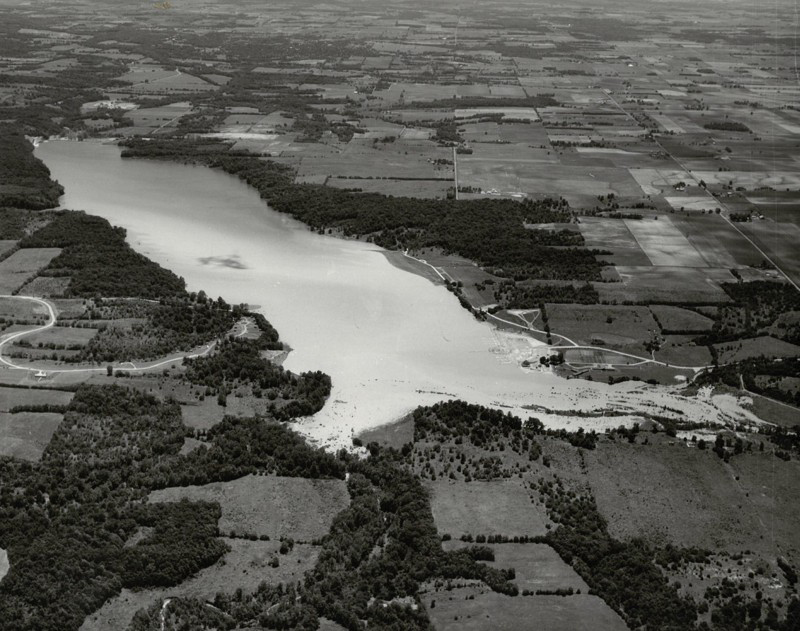
The 100-square-mile Acton Lake watershed drains into the 0.9-square-mile lake, used for recreational fishing and boating. Shown here after it opened in 1957 (photo from Journal News archives).
Little is known about long-term effects of agricultural changes on streams and lakes, Vanni said.
The practice of conservation tillage, which involves plowing the soil less frequently to reduce sediment runoff, was encouraged in the watershed area by the USDA in the early 1990s.
Similar changes are occurring in agriculture throughout the Midwest.
This practice strongly affected nutrients and sediments in streams that feed downstream Acton Lake, the researchers found.
They found an increase in the abundance of bottom-feeding fish, such as gizzard shad. These fish consume sediments and excrete nutrients into the water, providing more sources of nutrients for algae growth.
The amount of algae is controlled mostly by concentrations of sediment in the water and the abundance of bottom-feeding fish, Vanni said.
The LTREB research explores the long-term changes in these interactions.
“We wanted to compare how much nitrogen and phosphorous were coming in from the watershed, versus what was being supplied by the fish,” Vanni said. “We thought that movement of nutrients through the fish could be really important—and it turns out that it is.”
Decades of data reveal unexpected trends
Decades of data have revealed some surprises that would not have been detected in the short term. Research shows that stratification of nutrients in soil due to conservation tillage may be having unintended consequences in the Acton watershed. These effects are also seen in the Lake Erie watershed, according to Vanni. (See below for recent publications from the research team on storm events and on contrasting long-term trends in nutrient loads.)
Climate change and summer storms
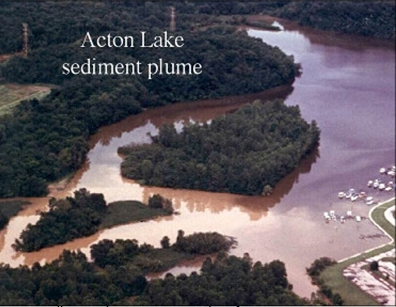
A sediment plume to Acton Lake after a summer storm (photo by Scott Davis).
Changes in agriculture are also mediated by climate change. Very wet springs followed by very dry summers have become more common in recent years in the Midwest, according to Vanni. This also affects nutrient input.
Water temperatures are increasing faster than the air temperature in some lakes, Vanni said. But in our area — and in similar agricultural landscapes — the effects of changing precipitation patterns on nutrients and sediments may be more important than the effects of temperature.
Big storms bring in a lot of the nutrients. In Acton Lake, more than half of the nutrients that come in one year can come in a matter of about 10 days, Vanni said.
- Learn more on the Acton LTREB Blog.
Long-term environmental research — more important now than ever
Long-term environmental research is fundamental to understanding an ecosystem’s response to environmental change. It is key to informing policy decisions about natural resources and environmental issues, especially in response to climate change.
After the first and second decades of their research, Vanni and his team discovered unexpected trends in nutrient and sediment inputs in Acton Lake.
“Now, what is going to happen after the third decade? Things can change and surprise us,” Vanni said.
Research opportunities for 100+ students over the years
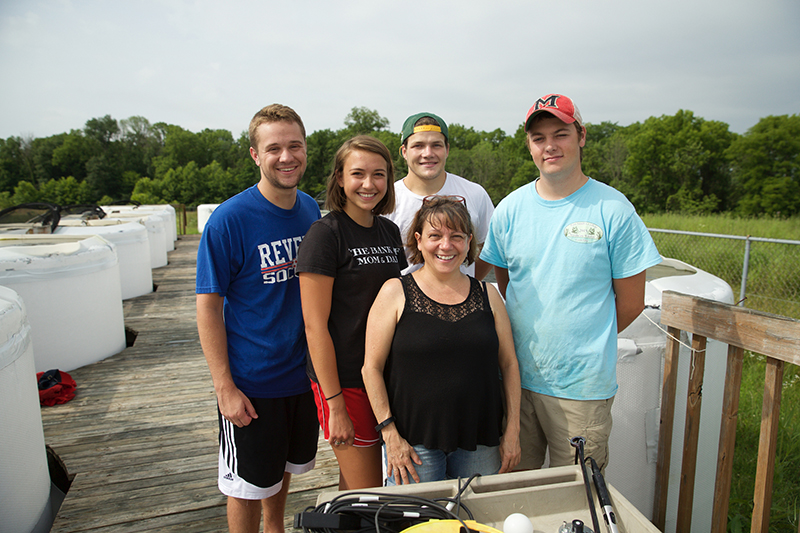
Maria Gonzalez (center) in 2015 with students (left to right) Matthew Bezbatchenko, 2015 Miami Hughes intern; Olivia Richter, 2015 USS; Nick Barrett (Miami M.S. '17); and Eco REU student Jonathan Steeler at Miami's Ecology Research Center (photo by Jeff Sabo).
The Acton Lake LTREB project has provided research opportunities for more than 100 Miami undergraduate students over the years, on projects mentored by Vanni, Gonzalez, Renwick and Grudzinski.
Many of these students conducted research full time in the summers, supported by fellowships from Miami’s Undergraduate Summer Scholars or Miami Hughes Intern programs. Others were supported by NSF REU (Research Experiences for Undergraduates) supplements to the LTREB grants.
Students from universities around the country have also contributed to this research through Miami's REU Site on Ecology in Human-Dominated Landscapes.
Current/recent undergraduate students:
Martina Rogers, junior chemistry major, works with Vanni. This past summer she was funded through a Research Experience for Undergraduates (REU) supplement from Vanni's previous LTREB grant.
Ashley Mickens, senior geology and environmental earth sciences major and sustainability co-major and a French minor, worked with Vanni in summer 2018 as a member of the Ecology REU program.
Ferdos Abdulkader, junior kinesiology major and premedical studies co-major, also worked with Vanni in summer 2018, funded through his REU supplement.
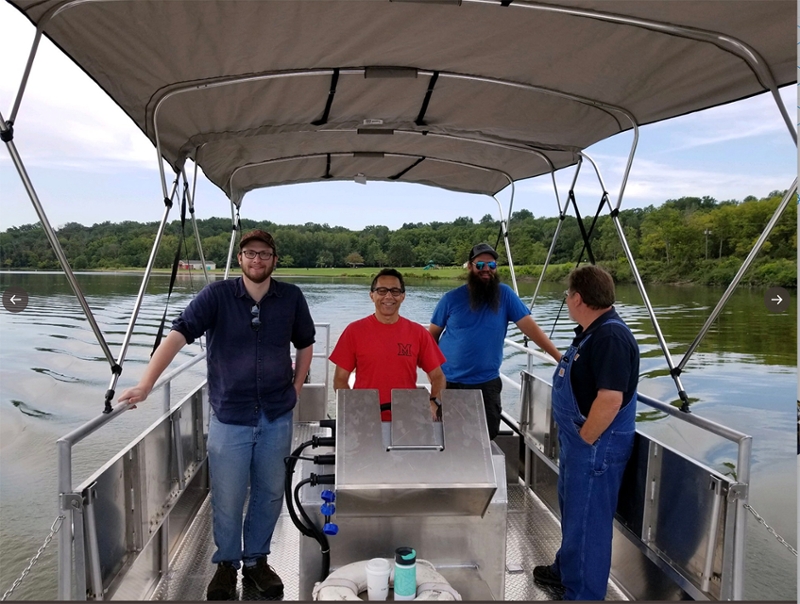
The department of biology's new pontoon boat, launched last month to replace the original boat circa 1986, will make weekly lake sampling more efficient.
Isabelle Anderson (Miami '19), currently a doctoral student at Baylor University, was a 2018 Undergraduate Summer Scholar with Vanni. She is first author of a paper with Vanni and others recently accepted in Limnology and Oceanography, the top aquatic sciences journal.
Josh Tivins, a junior biology major and previous Miami Regionals student, currently works with Gonzalez. He was a 2019 Miami Hughes intern.
Izzy Aristizabal, senior geography major and sustainability co-major, and Claire Stock, junior environmental earth science major and sustainability co-major, work with Grudzinski.
Current graduate students:
Tanner Williamson is a doctoral candidate advised by Vanni. He is the recipient of the 2019 Biology Dissertation Scholar Award. Graduate student Carrie Ann Sharitt is also advised by Vanni.
Heather Luken and Xiu Gao, master's students in biology, are advised by Gonzalez.
Tessa Farthing is a master's degree student in geography and geographic information science, advised by Grudzinski.
Recent publications from the research team include:
- "Stream Nitrogen And Phosphorus Loads Are Differentially Affected By Storm Events And The Difference May Be Exacerbated By Conservation Tillage"
- “Stream Nitrogen, Phosphorus, and Sediment Concentrations Show Contrasting Long-term Trends Associated with Agricultural Change.”
Follow Mike Vanni on Twitter @MJVanni and Tanner Williamson @ScienceTanner.
